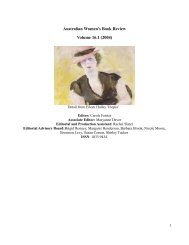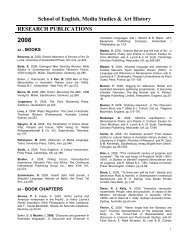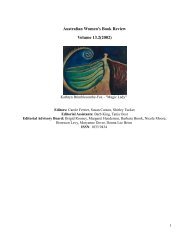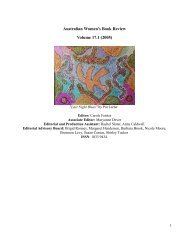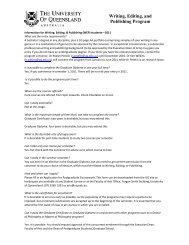Australian Women's Book Review Volume 14.1 - School of English ...
Australian Women's Book Review Volume 14.1 - School of English ...
Australian Women's Book Review Volume 14.1 - School of English ...
You also want an ePaper? Increase the reach of your titles
YUMPU automatically turns print PDFs into web optimized ePapers that Google loves.
Lest We Remember<br />
Carolyn Polizzotto, A Trick <strong>of</strong> the Light. Fremantle: Fremantle Arts Centre Press, 2001.<br />
<strong>Review</strong>ed by Tania Oost.<br />
A Trick <strong>of</strong> the Light is the memoir <strong>of</strong> <strong>Australian</strong>-born Carolyn Polizzotto that<br />
pieces together a hard-won recollection <strong>of</strong> her postwar childhood in the 1950s.<br />
It is interesting as a memoir because its point is what cannot be recalled about<br />
one's life, and why. She candidly reveals that there is much in her childhood<br />
which she is unable to remember (and in fact much <strong>of</strong> what she writes is<br />
second-hand information from her parents). Near the beginning <strong>of</strong> the book she<br />
asks: 'Why is there a gap where my childhood should be?' (27) Her memoir is an<br />
exploration <strong>of</strong> this question and an attempt to redeem her childhood memories.<br />
Her thinking about her lack <strong>of</strong> memory takes an existential turn and it is a<br />
pleasure to read her unique take on how her consciousness and memory were<br />
shaped in relation to language and silence.<br />
Polizzotto's childhood was dominated by a war that was never spoken about but that pervaded family<br />
life. She recalls that 'war was all around me and the fact that it was not spoken <strong>of</strong> made it more real, not<br />
less' (21). Her father had served in the <strong>Australian</strong> navy in World War Two and returned home with posttraumatic<br />
stress disorder. His disorder was not acknowledged, however, and he dealt with his trauma<br />
through silence and withdrawal. Interestingly, while specific references to her father are infrequent and<br />
peripheral in Polizzotto's memoir, his influence within her story, as with his influence over his family in<br />
the 1950s, is heavy and sombre. While he is mostly absent throughout these pages, the sense that the<br />
reader gets <strong>of</strong> his pervasive effect over the family is all the more powerful, and is skilfully invoked by<br />
the author.<br />
Polizzotto's father remained silent and withdrawn, and her mother dealt with him in a similarly evasive<br />
way. Polizzotto recalls her as always whispering to the children, shooing them out <strong>of</strong> the way and<br />
tiptoeing around her volatile husband. In this way her mother seemed to fade away, to lose herself to<br />
her husband's problems. Polizzotto, too, was deeply affected by her father's moods and by the<br />
oppressive atmosphere in the household. She recalls that she was always nervously attuned to her<br />
father's state <strong>of</strong> mind. Fear and tension were an everyday undercurrent that she took to be normal.<br />
Ritual and superficial pleasantries were necessary to disguise underlying problems and to suppress a<br />
truth which threatened to surface at any moment - that perhaps the war was not justified, that there<br />
were no real victors, or that, in the minds <strong>of</strong> these generations, it was not over.<br />
Polizzotto explains that this silence was used to raise a new generation <strong>of</strong> children with a clean slate -<br />
that is, the children were the clean slate. She believes that her generation functioned as a language,<br />
giving meaning and justification to the war:<br />
we and all our generation were the currency <strong>of</strong> the 1950s. We were our<br />
parent's lost innocence. Their teens and twenties, gone to war, were set to be<br />
our future. With us the speculators bought and sold land, orchards, cars and<br />
fridges. We were the reward <strong>of</strong> war and our happiness was the price <strong>of</strong><br />
peace. The fifties? We were its language. (56)<br />
63



